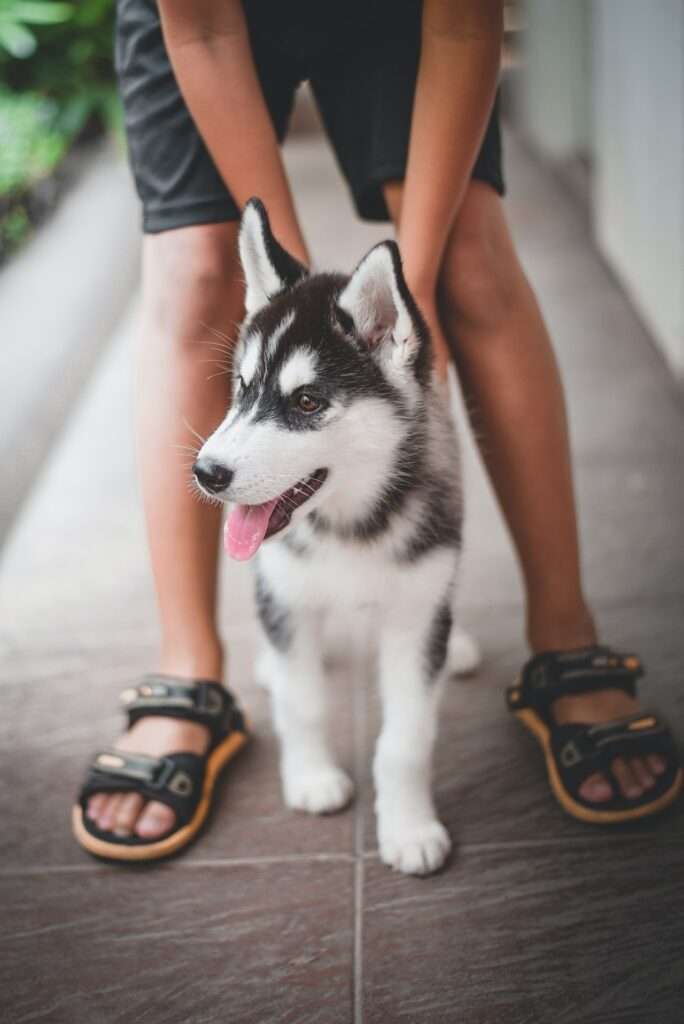How Much is a Husky? A Detailed Expenses Breakdown Guide
Huskies are a popular breed of dog known for their stunning appearance and friendly personalities. From their piercing blue eyes to their thick, fluffy coats, it’s no wonder that Huskies are a fan-favorite among dog lovers. Undoubtedly, owning a Husky entails a significant financial commitment that should not be underestimated.
In this detailed guide, we’ll delve into the different expenses involved in owning a Husky, from the initial purchase to ongoing costs, and offer practical tips on how to minimize expenses while still providing the best care for your four-legged companion.
How Much is a Husky?

The cost of buying a Husky can vary significantly, depending on several factors, such as the breeder’s reputation, the dog’s pedigree, and the location. Typically, the price of a Husky puppy can range anywhere from $600 to $2,500.
However, some breeders may charge even more for rare coat colors or exceptional bloodlines. While purchasing a Husky from a reputable breeder may cost more, it can provide assurance that your furry friend is healthy and properly socialized.
If you’re looking to save money on your initial purchase, consider adopting a Husky from a rescue organization. When adopting a Husky, the adoption fees usually range between $100 to $500, covering initial veterinary care such as vaccinations and spaying or neutering. Additionally, adopting a Husky helps support a worthy cause and can give a loving home to a dog in need.
When purchasing or adopting a Husky, it’s important to factor in additional expenses such as transportation costs, a crate, and initial supplies like food and toys. It’s crucial to budget appropriately for these expenses as they can quickly accumulate and become a significant financial burden.
Ongoing Expenses
While the initial purchase of a Husky can be a significant expense, the ongoing costs of owning one should not be overlooked. Some of the ongoing expenses to consider include:
- Food: Huskies require a high-quality diet to maintain their health and energy levels. The monthly cost of food for your Husky can range from $30 to $100, depending on the brand and type of food you choose to provide.
- Veterinary care: Over time, the cost of routine veterinary care for your Husky, including annual check-ups, vaccinations, and flea and tick prevention, can accumulate significantly. Additionally, unexpected medical expenses such as injuries or illnesses can be costly. It’s important to budget for these expenses and consider investing in pet insurance to help offset the costs.
- Grooming: Huskies require regular grooming to maintain their thick coats and prevent matting. The cost of professional grooming services for a Husky can vary based on the services offered and your location, ranging from $50 to $150 per session. Alternatively, you can learn to groom your Husky at home, which can save money over time.
- Training: Huskies are an intelligent breed but can be stubborn and challenging to train. Consider investing in obedience classes or working with a professional trainer to prevent behavior issues down the line.
- Other expenses: Other ongoing expenses to consider include toys, treats, and boarding or pet-sitting fees when you are away.
Cost of Owning a Husky
Provided below is a more in-depth table that breaks down the cost ranges for various expenses associated with owning a Husky:
Expense Type Cost Range Factors That Affect Cost Notes Purchase/Adoption $600 – $2,500 Breeder, pedigree, and location Adoption fees may be lower, but may not include initial medical expenses. Spaying/Neutering $200 – $500 Location and gender Some clinics offer low-cost options. Vaccinations $50 – $100 Location and type of vaccine Regular vaccinations are important for your husky’s health. Flea/Tick Prevention $10 – $50 Type of prevention Consider your local tick and flea population. Heartworm Prevention $5 – $15 Location and type of prevention Heartworm disease is common in many areas. Microchipping $50 – $100 Location Ensure your husky is properly identified. Training $50 – $200 per session Location and type of training Training can help prevent problem behaviors. Grooming $50 – $150 per session Location and services provided Regular grooming can keep your husky’s coat healthy. Food $30 – $100 per month Brand and type of food Feeding high-quality food can help reduce veterinary costs. Treats $10 – $20 per month Type of treat Treats should be given in moderation. Toys $10 – $50 per month Quality and quantity of items purchased Providing toys can prevent destructive behavior. Veterinary Care $300 – $500 per year Individual needs Cost can vary depending on emergency care, medications, or surgeries. Boarding or Pet Sitting $20 – $75 per day Location and duration of stay Consider the reputation of the facility or sitter. Miscellaneous Expenses $50 – $100 per month Individual needs Cost can vary depending on licensing fees, waste removal, and supplies.
The annual cost of owning a Husky can vary significantly based on factors such as location, individual needs, and lifestyle. On average, the annual cost can range from $1,300 – $1,900. However, it’s important to note that unexpected expenses such as emergency veterinary care, grooming needs, and training can quickly add up. Being financially prepared is essential for providing the best care for your beloved Husky.
Is a Husky Right for You?

While Huskies are a beloved breed, they are not for everyone. Providing proper care for a Husky demands a considerable amount of time, effort, and financial investment. Before bringing a Husky into your home, consider the following:
- Do you have the necessary time to dedicate to a Husky’s needs? Huskies are a high-energy breed that requires daily exercise and mental stimulation. They are not well-suited for apartment living or households with limited outdoor space.
- Can you afford the ongoing expenses of owning a Husky? As outlined above, owning a Husky can be a significant financial commitment. It’s important to budget accordingly and be prepared for unexpected expenses.
- Are you prepared to provide proper training and socialization for your Husky? Huskies can be stubborn and challenging to train, but consistent and early training can prevent behavior issues down the line.
- Do you have experience with large, active breeds? Huskies are not recommended for first-time dog owners or those with limited experience with larger breeds.
If you are committed to providing the best care for your Husky, the joy and companionship they bring can be priceless. However, it’s important to carefully consider the financial and time commitments before making the decision to bring one into your home.
Additional Expenses
In addition to the ongoing expenses outlined above, there are additional expenses to consider when owning a Husky:
- Housing: Huskies require plenty of space to run and play. If you live in an apartment or have a small yard, you may need to invest in additional exercise options such as a dog park membership or doggy daycare.
- Travel: If you plan to travel with your Husky, be prepared for additional expenses such as pet-friendly accommodations, transportation costs, and potential boarding fees.
- Repairs: Huskies are known for their digging and chewing behaviors, which can lead to damage around your home and yard. Be prepared to invest in repairs and replacements as needed.
- Emergency funds: Unexpected expenses such as accidents or illnesses can quickly add up. It’s important to have an emergency fund set aside for these situations.
Tips for Saving Money on Husky Expenses
While owning a Husky can be expensive, there are several ways to save money on their expenses. Consider the following tips:
- Buy in bulk: Opting to buy food and supplies in bulk can prove to be a cost-effective decision in the long run, helping you save money on your Husky’s expenses. Look for deals at your local pet store or consider ordering online in larger quantities.
- DIY grooming: Learning to groom your Husky at home can save money on professional grooming services. Invest in quality grooming tools and watch tutorials online to learn the proper techniques.
- Take advantage of free resources: Look for free or low-cost resources such as community dog parks, training classes, and pet events to provide exercise and socialization for your Husky.
- Consider pet insurance: While pet insurance does come with a monthly premium, it can save money in the long run by covering unexpected medical expenses.
- Keep up with preventative care: Keeping up with routine veterinary care and preventative measures such as flea and tick prevention can prevent more costly medical issues down the line.
Conclusion
While owning a Husky can bring immense joy and fulfillment, it’s important to acknowledge that it also involves a significant financial commitment. By carefully considering the expenses involved and budgeting accordingly, you can provide the best care for your furry friend without sacrificing your financial stability.
Remember to factor in ongoing expenses such as food, veterinary care, grooming, training, and other miscellaneous costs when budgeting for a Husky. Additionally, be prepared for additional expenses such as housing, travel, repairs, and emergency funds.
With proper planning and care, your Husky can become a beloved member of your family and provide endless joy and companionship. Consider the tips outlined above for saving money on their expenses and enjoy the many benefits of owning this beloved breed.
Frequently Asked Questions
How much does a Husky puppy cost on average?
The price of a Husky puppy can range anywhere from $600 to $2,500, depending on factors such as the breeder’s reputation, location, and the lineage and quality of the puppies. Some breeders may charge even more for rare coat colors or exceptional bloodlines.
Is it worth it to buy a Husky from a reputable breeder?
While purchasing a Husky from a reputable breeder may cost more, it can provide assurance that your furry friend is healthy and properly socialized.
What are some additional expenses I should be aware of when owning a Husky?
In addition to the cost of purchasing a Husky, you should also budget for expenses such as food, toys, grooming, vet visits, and potential medical emergencies. These expenses can add up over time, so it’s important to be prepared for the financial responsibility of owning a Husky.
Are there any other factors that can affect the cost of owning a Husky?
Yes, factors such as the Husky’s age, gender, and registration status can also affect the cost of owning a Husky. Additionally, if you adopt a Husky from a rescue organization, the adoption fee may be lower than purchasing a Husky from a breeder.
How often should I groom my Husky?
Huskies have a thick double coat that sheds heavily twice a year. During shedding season, daily brushing is recommended to prevent matting and hairballs. Outside of shedding season, weekly brushing is usually sufficient.
Do Huskies have any common health issues I should be aware of?
Huskies are generally a healthy breed, but they can be prone to certain health issues such as hip dysplasia, eye problems, and skin allergies. Regular vet checkups and preventative care can help keep your Husky healthy.
Are Huskies good with children?
Huskies can be great with children if they are socialized properly and trained to be gentle. However, they are a high-energy breed that requires a lot of exercise and attention, so they may not be the best fit for families with very young children or those who cannot provide enough exercise and stimulation.
How much exercise does a Husky need?
Huskies are a high-energy breed that require at least 30-60 minutes of exercise and playtime per day. They also benefit from activities such as hiking, running, and agility training.
Do Huskies get along with other pets?
Huskies can get along with other pets if they are socialized properly and introduced slowly and carefully. However, they have a strong prey drive and may not be a good fit for households with small animals such as cats or rodents.
What should I look for in a reputable Husky breeder?
When choosing a Husky breeder, look for someone who is knowledgeable about the breed, breeds for health and temperament, and provides proper socialization and care for their puppies. Additionally, a reputable breeder should be willing to answer your questions and provide references from previous customers.




